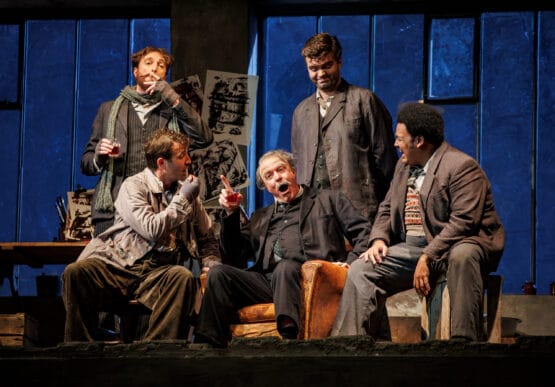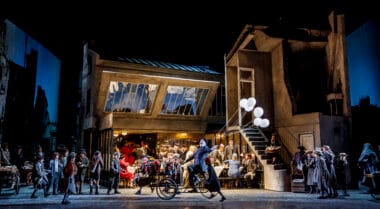
Puccini, La bohème: Soloists, Chorus of St Joseph’s Catholic Primary School; Chorus and Orchestra of English National Opera / Clelia Cafiero (conductor). London Coliseum, 3.10.2024
Production:
Original director – Sir Jonathan Miller
Revival director – Crispin Lord
Designer – Isabella Bywater
Lighting designer – Jean Kalman
Revival Lighting director – Marc Rosette
Translation – Amanda Holden
Cast:
Mimì – Madeline Boreham (replacing Nadine Benjamin)
Rodolfo – Joshua Blue
Marcello – Charles Rice
Musetta – Vuvu Mpofu
Parpignol = Adam Sullivan
Schaunard – Patrick Alexander Keefe
Colline – Dingle Yandell
Benoît – Paul Sheehan
Alcindoro – Andrew Tinkler
Parpignol – Adam Sullivan
Official – Robert Winslade Anderson
Policeman – Ronald Nairne
This was part of the opening run of the 2024/5 season of ENO: in the first performance on September 26, the principal role of Mimį was taken by Nadine Benjamin, who had teased us with excerpts with piano (the excellent Jan Karl Rautio) at the Thaxted Festival in the summer, review here). On this particular Thursday evening, however, it was not to be. A slightly delayed start and the arrival of a spokesperson in front of the curtain did not augur well, and so it was: Benjamin was unwell, and so it fell to the cover singer, Madeline Boreham to step in.
Some might have heard Boreham in the 2023 Opera Holland Park Young Artists performance of Humperdinck’s Hänsel und Gretel (there’s an interview with her on the OHP website about that here); she also was one of a four-singer ‘chorus’ for a Royal College of Music Die Zauberflöte (reviewed by my colleague Mark Berry here). This was my first acquaintance with her, however, and she had big shoes to fill: Nadine Benjamin’s Mimì is one of the finest. This was quite a way to make a house debut, and although not yet a fully-formed, all-encompassing Mimì, there is no doubting Boreham’s promise.
Both leads, Boreham and Joshua Blue’s Rodolfo, in fact, took time to settle, with both over-compensating for the London Coliseum’s space in the earlier stages (Blue in particular seemed intent on projecting not just to the rafters, but beyond). Once settled, the flow and balance was far better (Blue’s move towards speech in the final act, though, brought in a Stateside accent that jarred from his sung English). One should credit the growth of Boreham’s portrayal, too: the fourth act death scene was as touching as it should be. There seemed to be something of a turning point in the third act (‘Help me, Rodolfo, help me’) at which she really inhabited the role (and as if in response, Blue’s tenor really opened up around here).
I for one would like to see more of Boreham. Operabase lists only one event (bizarrely, it looks like she performed in Richard Strauss’s Duettt-Concertino, a piece for clarinet, bassoon and orchestra, but a further click brings in Strauss’s orchestral songs: the RCM orchestra was conducted by Antonio Pappano). Previous to Benjamin, it was Sinéad Campbell-Wallace, another singer who goes from strength to strength, who sang Mimì; soon, without doubt, Boreham will continue that strong lineage.
There was some tinkering with the casting from last time round for this Bohème: Simon Butteriss sang both Benoît and Alcindoro previously; now we had two different singers (Paul Sheehan as Benoît – and Andrew Tinkler – who had previously sung the Official – as Alcindoro). Of the smaller roles, a special mention is due for the fine bass of Robert Winslade Anderson’s Official and the characterful Adam Sullivan as the, in this production, Chaplinesque Parpignol. And talking of smaller contributions (in terms of inches tall rather than impact), the Children of St Joseph’s Catholic Primary School made a massive impact in the second act, their acting up there with the enthusiasm of their confident and accurate singing.

Charles Rice’s contribution as Marcello this time was less striking, less individual than last time, which came as something of a surprise: the presence seemed less, both dramatically and vocally. Harewood Young Artist Patrick Alexander Keefe was a fine Schaunard, though; and the surprise stand-out aria of the evening came not from the mouth of either Mimì or Rodolfo, but from Colline, a character listed here as ‘a scholar’ (more often, a philosopher), and sung here by Dingle Yandell. Colline’s so-called Coat Aria (‘Vecchia zimara’ in the original) was magical, laden with grief, the separation-anxiety and heavy heart at having to sell the vestment a palpable example of pre-bereavement grief, a symbol of the imminent void of Mimì’s passing. It was performed beautifully, each phrase carefully considered, each word perfectly judged. This is one name to watch, perhaps even over and above Boreham’s: (Dingell incidentally also took the role of Zuniga Carmen at this year’s Glyndebourne BBC Prom.)
Musetta is a wonderful role, and one that often leads on to Mimì herself. Here, it was Vuvu Mpufu who offered up a feast for the ears and eyes, cheeky, outgoing, and perfect for the second act; and yet we saw hints of a deeper aspect in her reactions to Mimì’s death and its approach.
The conductor was Clelia Cafiero, making a UK and ENO opera debut: she is currently the Principal Guest Conductor at Opéra de Tours. She has previously conducted Laurent Pelly’s production of Mozart’s Così fan tutte in Tokyo and in 2025 will conduct at La Scala, specifically Silvia Colasanti’s opera Anna A. (on the Russian poet Anna Akhmatova). Cafiero draws fine colour from the ENO orchestra and works well with her singers. Maybe more attention to the relationship between the small to the large – the honouring of Puccini’s larger-scale process – would just bring everything together. The big disjunctive moment in the final act – from Bohemian frolickery to high tragedy – lost impact; the dramatic lightning-strike should unforgettably colour Mimì’s last moments. But this was a fine Bohème, beyond doubt, and the frisson of an unexpected cast change certainly helped focus.
Of course, Jonathan Miller’s legendary production helps. It is one of those stagings where on each exposure, one notices more detail, each perfectly placed or judged, the whole perfectly honoured in Isabella Bywater’s lighting. Miller’s ferocious curiosity shines through his work, and in doing so illuminates Puccini’s masterly score, in the composer’s centenary year.
Photos © Lloyd Winters




,%20Flores%20(Issicratea)%20©%20Clemens%20Manser%20Photography.jpg?w=670&resize=670,446&ssl=1)




